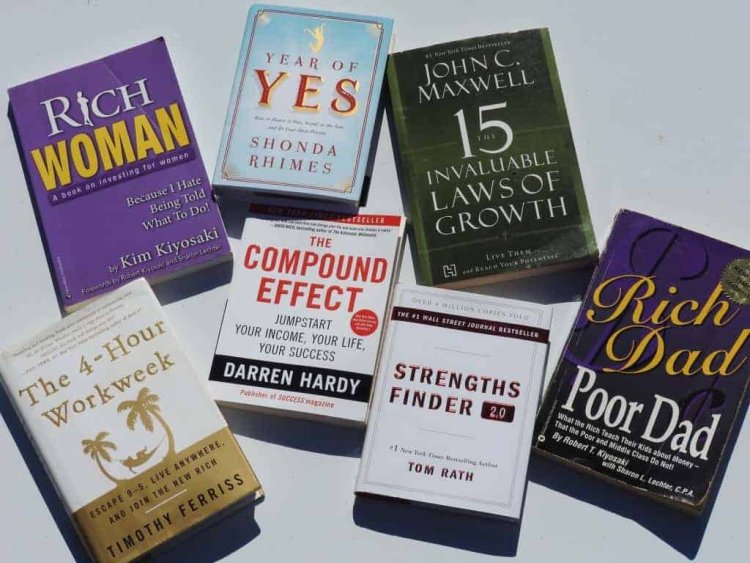Personal Development Books Every Student Should Read
The Last Lecture The Happiness Project Failing Forward: Turning Mistakes into Stepping Stones for Success The Attention Revolution: Unlocking the Power of the Focused Mind Getting Things Done: The Art of Stress-Free Productivity The 4-Hour Workweek Lean In How to Win Friends and Influence People Rich Dad, Poor Da

Shakespeare, Orwell, Austen, etc. are all authors that we are urged to read in school. While these are required reading for any bookworm, there is an argument to be made for picking up books that inspire you to live a deeper, richer, and more meaningful life as well. Books about personal development are intended to help you become the person you aspire to be. To become the best, happiest, most successful version of yourself, there is no time like the present to start reading books that can help you get there.
1. Small Move, Big Change
by Caroline Arnold
![Small Move, Big Change: Using Microresolutions to Transform Your Life Permanently by [Caroline L. Arnold]](https://m.media-amazon.com/images/I/41j0EkorRwL.jpg)
Incorporating'microresolutions,' or minor adjustments in behaviour, into our regular routine can lead to long-lasting improvements in almost any aspect of life. Small, easily attained goals are more likely to stick because of the association between them and our routines and external stimuli. Anyone serious about making positive behavioural changes should read this.
2. The Last Lecture
by Randy Pausch

With only a few months left to live, what would you want to discuss? Professor Randy Pausch had to answer this question a month after learning he had terminal cancer.
This book is based on his now-famous speech, "Really Achieving Your Childhood Dreams," in which he encourages his students and readers to reflect on their own goals and dreams from their youth.
He doesn't recommend going into the circus or trying to become an astronaut, but he does encourage you to live the way you want to rather than being constrained by social norms or what you're "supposed to do."
Stories from Pausch's upbringing that he wished to share with his own children are included in the book to round out the talk.
3. The Happiness Project
by Gretchen Rubin

Gretchen Rubin's reputation as somewhat of a happiness guru has grown since the publication of this best-seller. Most people would agree that the pursuit of happiness is paramount, and most parents would list that as their top want for their children. So why is it that putting yourself first these days is considered as selfish?
When Rubin realised that she wasn't as content as she should have been, given how good things were going for her, she devoted a whole year to a study of happiness she called her "happiness project." She meticulously monitored her happiness-inducing routines throughout a dozen domains of her life. Despite the fact that "everyone's happiness project will be different," Rubin provides his readers with a framework for achieving their own personal fulfilment.
This is required reading for everyone who wants to take charge of their own happiness by learning more about the factors that contribute to it and how to use those discoveries in daily life.
4. Failing Forward: Turning Mistakes into Stepping Stones for Success
by John C. Maxwell

We learn early on that failure is something to be avoided at all costs. You don't want to end up as a failure, do you? But the reality is that we all have setbacks in our lives. Rather than asking if we will fail, we should be asking what we will do when we do. As John C. Maxwell puts it, "when achievers fail, they see it as a momentary event, not a lifelong epidemic."
Taking responsibility for our actions and gaining insight from our mistakes is the only way to develop personally, professionally, and socially. Successful people are those who have tried and tried again despite setbacks. Before James Dyson made his first hoover cleaner that was a commercial success, he invented 5,126 prototypes. He learned from his mistakes and used them to propel himself forward. This book shows you how to take note of your mistakes, examine them critically, and grow from them.
5. The Attention Revolution: Unlocking the Power of the Focused Mind
by Alan Wallace

There has never been so much technology vying for our attention all at once. Thanks to technological advancements like smartphones, social media, and push notifications, the average human being now has the attention span of a gold fish. An further source of distraction in our daily lives comes in the form of apps designed to help us concentrate better.
In The Attention Revolution, Wallace teaches his readers how to achieve the enlightened state of mind known as Shamatha, the pinnacle of Buddhist meditation. Though it's nearly impossible to master in a single lifetime, the advice below will help you regain control of your attention and channel it towards whatever you set your mind to, whether that's a test, a pastime, or a sport.
6. Getting Things Done: The Art of Stress-Free Productivity
by David Allen

Even if the title doesn't interest you, this should be the one and only book on productivity you ever read.
The Getting Things Done (GTD) methodology is predicated on the premise that one should eliminate mental clutter by writing down one's to-dos and other related chores. To begin, use the two-minute rule. If it can be done in less than two minutes, do it right now. Just remember these five easy steps: capture, clarify, arrange, reflect, and interact, if you need more time. If you adhere to these two rules, you'll be able to take charge of just about anything in your life. Seem easy enough? The answer is yes, of course. You can immediately put it to use in your academic pursuits, extracurricular activities, and other endeavours.
Although Allen's original book was released in 2001, he has maintained it current and applicable to today's hectic and distracting world of email, social media, and multitasking.













